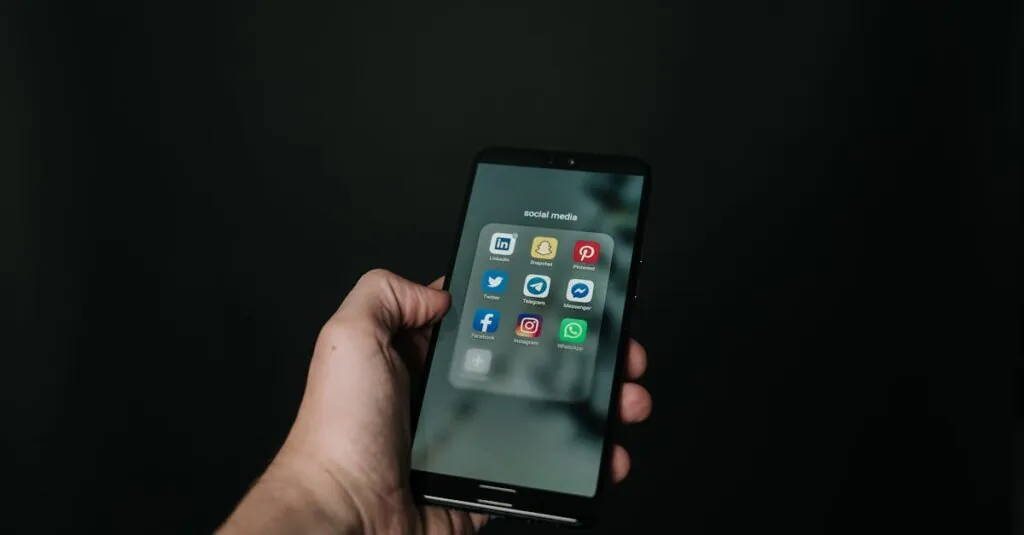Table of Contents
ToggleIn today’s fast-paced world, self-care often takes a backseat. Between juggling work, family, and that never-ending to-do list, finding time to unwind can feel like searching for a unicorn. Enter self-care apps—the digital sidekicks that swoop in to save the day. These little gems are designed to help anyone reclaim their sanity while offering a sprinkle of joy and relaxation.
Overview of Self Care Apps
Self-care apps serve as valuable resources designed to enhance mental well-being. Users can find various features tailored to their needs, from meditation sessions to mood tracking. Tracking daily emotions contributes to a deeper understanding of one’s mental health, enabling individuals to identify patterns and triggers effectively.
Many apps provide guided exercises that promote relaxation, helping users create a balanced routine. Additionally, reminders can foster accountability, encouraging consistent self-care practices. From mindfulness to journaling, these applications address diverse aspects of self-care, offering personalized experiences.
Some platforms include community features, allowing users to connect with others on similar journeys. These connections can improve motivation, reduce feelings of isolation, and encourage shared experiences. Using self-care apps can lead to better stress management and overall improved quality of life.
Studies indicate that individuals who engage with self-care apps experience enhanced emotional resilience and increased happiness levels. Users report that incorporating technology into their wellness journey makes self-care more accessible and manageable. Ultimately, self-care apps play a crucial role in promoting mental health in today’s fast-paced environment.
Benefits of Self Care Apps
Self-care apps offer various benefits that help individuals prioritize mental well-being and emotional health. These tools support users in navigating daily stressors while improving overall quality of life.
Improved Mental Health
Improved mental health results from consistent engagement with self-care apps. Users often find guided meditations and mood tracking features enhance their understanding of personal emotional patterns. Data shows that regular use correlates with reduced anxiety and increased emotional resilience. Tracking daily emotions activates self-reflection, allowing individuals to identify triggers and coping strategies. Creating a routine via reminder settings serves to establish healthier habits. Ultimately, these tools become vital in fostering a proactive approach to mental wellness.
Enhanced Emotional Well-Being
Enhanced emotional well-being thrives through community interaction within self-care apps. Users connect with like-minded individuals, fostering a sense of belonging amidst their self-care journey. Sharing experiences can lead to increased motivation and reduced feelings of isolation. Additionally, engaging with exercises that foster gratitude and mindfulness promotes a positive mindset. Daily check-ins encourage reflection on achievements and progress, allowing users to celebrate small victories. Together, these features cultivate an environment where emotional stability and happiness flourish.
Popular Self Care Apps
Self-care apps continue to gain traction, providing users with a range of valuable features. These tools enhance mental well-being, making self-care practices more accessible and manageable.
Features to Look For
Look for apps that include guided meditations, mood tracking, and personalized reminders. Effective self-care apps often offer customizable settings, allowing users to tailor their experience based on individual needs. Search for platforms with community support features, which can promote connection and motivation. Prioritize apps that provide educational content on mental health topics, enabling users to learn and grow. Check for progress tracking functions that help users reflect on their self-care journey, fostering accountability.
User Experiences and Reviews
Users consistently highlight the positive impact self-care apps have on their mental health. Many report feeling more in tune with their emotions after using mood tracking features. Impressions of community aspects reveal that connecting with others enhances motivation and reduces feelings of isolation. Reviews often mention that regular engagement with guided meditations leads to improved emotional resilience and reduced anxiety. Positive feedback emphasizes ease of use, making these apps suitable for individuals with busy lifestyles. Users appreciate receiving reminders as they help establish healthy habits and routines.
Challenges and Limitations
Despite the advantages of self-care apps, several challenges and limitations exist. Users encounter varying levels of engagement, with some finding it difficult to stay motivated consistently. Individuals often face distractions in their daily routines, making it hard to prioritize self-care amidst other responsibilities.
App effectiveness also varies among users; not all platforms provide the same quality of resources or support. Some might lack personalized features, reducing their impact on individual mental wellness. Community interactions can also be a double-edged sword, as not everyone feels comfortable sharing personal experiences or connecting with others.
Privacy concerns arise for many users as they may hesitate to share sensitive information within these apps. Data security becomes paramount, and individuals often question whether their mental health information remains confidential. Reliability issues may also surface, with technical glitches disrupting user experience and engagement.
Additionally, there’s a risk of over-reliance on technology for emotional support. Users might neglect traditional self-care methods, such as in-person therapy, while depending heavily on app features for happiness and relaxation. Disappointment can occur when expectations from these apps don’t meet personal needs or preferences.
Lastly, the dynamic nature of mental health means that a one-size-fits-all solution rarely suffices. Individuals must adapt their strategies according to their unique circumstances, which can complicate the effectiveness of any single app. In summary, while self-care apps offer valuable tools for promoting mental health, recognition of their challenges and limitations is essential for making informed choices.
Self-care apps have emerged as powerful allies in the quest for better mental health. They provide users with the tools to understand their emotions and cultivate healthier habits in a fast-paced world. By integrating features like mood tracking and community support, these apps make self-care more accessible and engaging.
While they offer numerous benefits, it’s crucial to approach them with awareness of their limitations. Users should balance app usage with traditional self-care methods to ensure a comprehensive approach to mental well-being. Ultimately, self-care apps can significantly enhance emotional resilience and happiness when used thoughtfully.







